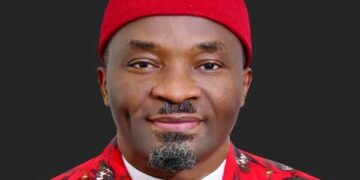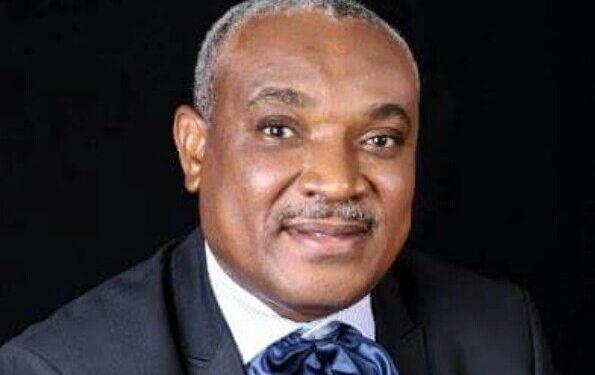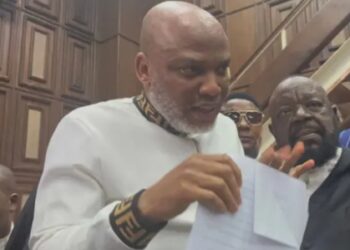By Our Reporters
Former presidential aide, Okoi Obono-Obla, has described ex-Vice President Atiku Abubakar as an unreliable political figure whose frequent defections and broken alliances will continue to undermine opposition stability in Nigeria.
Obono-Obla who spoke with Spear News in recent interview, painted a picture of a career marred by shifting loyalties, beginning with Atiku’s tumultuous tenure as vice president from 1999 to 2007.
He said here was a man who rose to become Nigeria’s number two citizen, only to fall out spectacularly with his principal, President Obasanjo, and survive impeachment solely through judicial intervention.
He added that Atiku Abubakar has continue to demonstrat a lack of political consistency, a trait unbecoming of a leader of his stature. Unlike figures such as Tinubu and Buhari, who built and stood by their own political platforms, Atiku repeatedly switched allegiances, undermining his credibility. Such instability does not reflect well on a would be statesman.
“Somebody who is supposed to be an icon, he served in the Nigerian Customs Service and later went into politics. He was Vice President of Nigeria from 1999 to 2007. During that time, he had issues with his boss, President Obasanjo, who tried to remove him from office. However, he was saved by the judiciary”, said Obono-Obla
The APC chieftain also explained how Tinubu supposedly gave Atiku’s fading political career a second wind, yet he allegedly betrayed the trust.
“President Tinubu gave him a platform through the Action Congress (AC), which helped to revive his political career”.
Detailing the formation of Nigeria’s opposition, he explained: “President Buhari, President Tinubu, and himself were engaging and discussing the creation of a national party that would serve as a platform to remove the PDP from power. They used to meet under the group known as the National Democratic Movement.”
However, Obono-Obla noted Atiku’s abrupt departure: “As soon as Yar’Adua died and Jonathan became president, he left the Action Congress and returned to the PDP because he felt Jonathan had no need to continue as President.”
Expressing disappointment at Atiku’s political inconsistency, Obono-Obla said: “He contested the 2014 APC presidential primaries where Buhari won, Kwankwaso came second, and Atiku placed third. After waiting until 2017, he left APC again to return to PDP.
“This is why I say he has not stayed consistent. A political leader of his stature should not behave that way. I would have expected him to build and stay with his own political platform, just as Tinubu and Buhari did. They created their own parties because they didn’t want to be jumping from one party to another. It doesn’t reflect well on a leader.”
Turning to PDP’s current crisis, Obono-Obla stastad: “He (Atiku) is responsible for the crisis within the PDP. The PDP has a zoning policy, something APC lacks, which stipulates that power should rotate between the North and South. Nigeria, essentially, is made up of two major blocs: North and South.
However, he insisted on contesting, secured the ticket, and became PDP’s candidate, leading to deep divisions in the party.”
“Politicians must respect such agreements for the stability of the country. But unfortunately, he has chosen to defy this understanding because of his ambition to become president at all costs”, he warned.
Former Vice President and perennial presidential candidate Atiku Abubakar is once again poised to gauge his political appeal, this time as the leader of a coalition for the 2027 presidential election, and, naturally, as the standard-bearer of any platform that suits his ambitions.
Spear News reports that, Atiku has been vying for the presidency since 1993 but has yet to secure victory.
Spear News outlines the timeline of presidential elections and primaries in which Atiku has competed unsuccessfully:
- In the 2007 presidential election, he stood as the Action Congress candidate, finishing third behind Umaru Yar’Adua of the PDP and Muhammadu Buhari of the ANPP.
- During the 2011 presidential election, he contested the People’s Democratic Party (PDP) primaries but lost to the incumbent, President Goodluck Jonathan.
- Ahead of the 2015 presidential election, he joined the All Progressives Congress (APC) but was defeated by Muhammadu Buhari in the party’s primaries.
- In 2017, he returned to the PDP and became its presidential candidate for the 2019 election, only to lose once more to incumbent President Muhammadu Buhari.
- In 2023, despite the PDP’s zoning agreement, Atiku insisted on contesting the party’s presidential primary. He secured the nomination but was ultimately defeated by Bola Tinubu in the general election.








































Discussion about this post